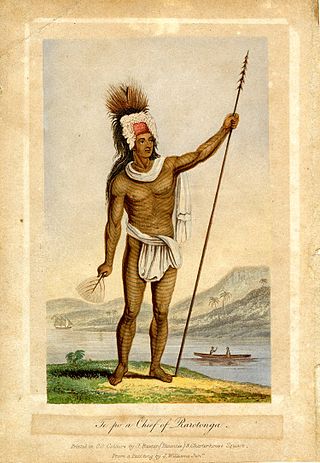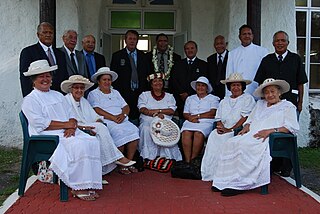
The Cook Islands are named after Captain James Cook, who visited the islands in 1773 and 1777, although Spanish navigator Alvaro de Mendaña was the first European to reach the islands in 1595. The Cook Islands became aligned to the United Kingdom in 1890, largely because of the fear of British residents that France might occupy the islands as it already had Tahiti.

Rakahanga is part of the Cook Islands, situated in the central-southern Pacific Ocean. The unspoilt atoll is 1,248 kilometres from the Cook Islands' capital, Rarotonga, and lies 1,111 kilometres south of the equator. Its nearest neighbour is Manihiki which is just 44 kilometres away. Rakahanga's area is 4 square kilometres (1.5 sq mi). Its highest point is approximately 5 metres above sea level. The population was 83 in the 2016 Census of Population & Dwellings, with a density ratio of 32 people per square kilometer. Since 2014 Rakahanga's electricity has been 100% solar generated. The Rakahanga-Manihiki language differs from Cook Islands Maori.

Albert Royle Henry was the first Premier of the Cook Islands and the founder and first leader of the Cook Islands Party (CIP). First elected Premier in August 1965, he was unseated in the aftermath of the 1978 election after an electoral petition found he had committed electoral fraud. He was later stripped of his knighthood. In 2023 he was posthumously pardoned.

The House of Ariki is a parliamentary body in the Cook Islands. It is composed of Cook Islands high chiefs (ariki), appointed by the King's Representative. While it functions in a similar way to the House of Lords and the Senate of Canada, the country's parliament is officially unicameral. There are up to twenty-four members, representing different islands of the Cooks.
Norman George is a Cook Islands politician and former Speaker of the Cook Islands Parliament, Deputy Prime Minister, and Cabinet Minister.

General elections were held in the Cook Islands on 30 March 1978 to elect members of the Legislative Assembly. The result was a victory for the Cook Islands Party (CIP) of Premier Albert Henry, which won 15 of the 22 seats. The Democratic Party won the remaining seven seats.
Wilkie Olaf Patua Rasmussen is a Cook Islands politician and former Cabinet Minister. From 2013 to 2015 he was leader of the Cook Islands Democratic Party.

General elections were held in the Cook Islands on 17 November 2010 in order to elect 24 MPs to the Cook Islands Parliament. The elections were won by the Cook Islands Party, which won 16 of the 24 seats. Voter turnout was 78%.
Piho Rua is a Cook Islands politician and former member of the Cook Islands Parliament.

General elections were held in the Cook Islands on 1 May 1968. The result was a victory for the Cook Islands Party (CIP), which won 16 seats, a gain of two from the 1965 elections. The newly formed United Cook Islanders won the other six seats to become the parliamentary opposition. CIP leader Albert Henry continued as Prime Minister.
The United Cook Islanders was a political party in the Cook Islands. It was established on 16 February 1968 in order to challenge the then-dominant Cook Islands Party and provide a more organised opposition. The party was organised by David Hosking and Taira Rere. Prominent members included former CIP cabinet ministers Manea Tamarua and Mana Strickland. The party did not initially have a formal leader, though Hosking served as "campaign leader"

Early general elections were held in the Cook Islands on 3 December 1974. The result was a victory for the ruling Cook Islands Party (CIP), which won 14 of the 22 seats in the Legislative Assembly with 64% of the vote. The Democratic Party won the remaining eight seats. CIP leader Albert Henry remained Premier.
Te Ariki Terau Mana Strickland BEM was a Cook Island educator and politician. He was the Minister of Education in the first Cook Islands government after self-government was obtained in 1965.
Sir Pupuke Robati, KBE was a Cook Island politician. He served as Prime Minister of the Cook Islands from 29 July 1987 to 1 February 1989.
Tina Pupuke-Browne is a Cook Islands politician and a member of the Cook Islands Parliament. She is the leader of the Democratic Party.

General elections were held in the Cook Islands in May 1961.

Dick Charles Brown was a Cook Islands businessman and politician. He served as a member of the Legislative Assembly between 1958 and 1965, and became the territory's first Leader of Government Business in 1963.

Robert Julian Dashwood was a British-born Cook Islands writer and politician. He was a member of the Legislative Assembly between 1963 and 1966 and served in the territory's first two cabinets.

Ngatupuna Matepi (1909–1977) was a Cook Islands politician. He served as a member of the Legislative Assembly from 1958 until his death, had two spells in the cabinet between 1962 and 1965, and became the first official Leader of the Opposition in 1968.
Tiakana Numanga was a Cook Islands politician. He served as a member of the Legislative Assembly between 1965 and his death and held several ministerial portfolios, including being Deputy Premier.









